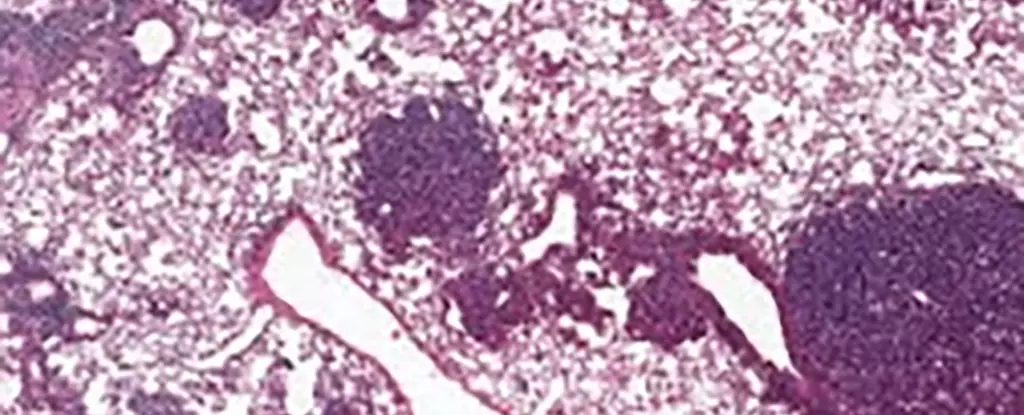Aging is an inevitable part of life, yet its impact on health, particularly regarding cancer, remains a profound area of study. As individuals progress through their lifespan, they face varying risks associated with cancer, distinctively observable in the latter stages of life. Surprisingly, recent scientific findings reveal a paradox: while cancer risk escalates notably in the 60s and 70s, it exhibits a decline after the age of 80. This article delves into groundbreaking research that uncovers the underlying mechanisms of this phenomenon, highlighting key cellular processes that could revolutionize our understanding of cancer treatment and prevention in older populations.
The relationship between aging and cancer is complex. Typically, the body accumulates genetic mutations over time, leading to an increased susceptibility to various forms of cancer. However, a pivotal study exploring lung cancer in mice introduces a crucial variable: the behavior of alveolar type 2 (AT2) stem cells. These cells are integral to lung repair and regeneration, as well as being a frequent origin point for lung cancers.
The researchers noted that older mice exhibited elevated levels of a protein known as NUPR1. This protein played a significant role in cellular behavior by mimicking a state of iron deficiency, despite the cells possessing an abundance of iron. This intriguing paradox suggests that aging cells, while rich in iron, appear to lose their regenerative capabilities, thereby hindering both healthy cell growth and tumor proliferation.
Cancer biologist Xueqian Zhuang from Memorial Sloan Kettering Cancer Center emphasized the peculiar behavior of these aging cells, stating, “Aging cells lose their capacity for renewal and therefore for the runaway growth that happens in cancer.” The connection between NUPR1 and iron availability presents a significant breakthrough in understanding how aging impacts cellular functions. As researchers replicated these findings in human cells, it became clearer that manipulating iron levels or NUPR1 expression could restore growth potential in cells.
This discovery opens doors for potential therapies targeting iron metabolism, particularly beneficial for older individuals facing health issues like long-term COVID-19 effects. Moreover, the implications extend into cancer treatment strategies involving ferroptosis, a cell death mechanism triggered by iron. Interestingly, researchers found that older cells display a reduced incidence of ferroptosis, potentially rendering them more resilient against contemporaneous cancer therapies, emphasizing the urgency of timely intervention.
Implications for Cancer Prevention and Treatment
Beyond treatment strategies, these findings magnify the necessity of understanding cancer risk factors throughout different life stages. Tuomas Tammela, another researcher from MSK, pointed out that the environmental exposures we encounter in our youth, such as smoking or excessive sun exposure, may carry significant risks for younger individuals that could lead to serious health complications later in life. This insight shifts the focus toward proactive preventive measures and lifestyle modifications, reinforcing the idea that early intervention can drastically reduce cancer risk.
The implications of this research extend far beyond theoretical understandings; they call for a tailored approach in cancer treatments that considers not only the type and stage of cancer but also the patient’s age and overall health status. The findings underscore the necessity for personalized medicine in oncology, where treatments can be adjusted based on individual patient profiles to enhance efficacy.
A Path Forward: The Future of Cancer Research
Despite the promising advancements unveiled by this study, there remains a considerable amount of work to be done. Understanding the nuances of aging and its intricate relationship with cancer biology is still in its infancy. Researchers must continue to examine how age alters various cellular processes to unravel the mysteries of cancer at all life stages.
As Zhuang notes, “There’s still a lot that’s unknown about how aging actually changes the biology of cancer.” This acknowledgement highlights a call to action for the scientific community to drive further research, revealing opportunities to refine prevention strategies and therapeutic protocols, ultimately paving the way for more effective cancer care as we navigate the complexities of aging.
The intersection of aging and cancer risk unveils a compelling narrative that illuminates the challenges of modern medicine in combating cancer. By addressing the unique biological processes that occur with aging, we can aspire toward a future where personalized treatments not only target cancerous growths but also empower individuals to lead healthier, longer lives.


Leave a Reply